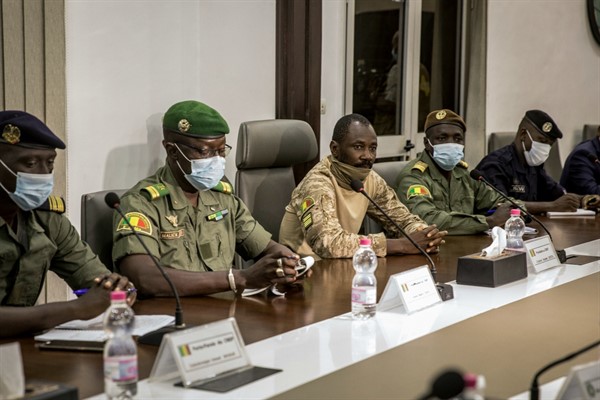After the unpopular president of Mali, Ibrahim Boubacar Keita, was ousted by the country’s military last month, the leaders of the coup promised to set up a transitional civilian government and eventually hold elections. That came as a relief to the crowds of anti-government protesters who had been in the streets for months, demanding Keita’s resignation.
Since the coup, however, things haven’t exactly gone according to plan. Following three days of talks with opposition groups and representatives from civil society, Mali’s ruling military junta recently released its blueprint for a transition plan back to civilian government. But the plan was promptly rejected by the coalition that led the anti-Keita protests, the M5-RFP. The junta is also under pressure from the Economic Community of West African States, a regional bloc of countries known as ECOWAS, to appoint a civilian leader to head the transitional government.
But according to Alex Thurston, a WPR contributor and assistant professor of political science at the University of Cincinnati specializing in the Sahel region of Africa, ECOWAS may lack the credibility and the leverage required to engineer a return to democratic rule. Today on Trend Lines, Thurston joins WPR’s Elliot Waldman to discuss the outlook in Mali and ECOWAS’ role there. You can follow Alex on Twitter @sahelblog, and look out for his forthcoming book, “Jihadists of North Africa and the Sahel,” scheduled for release this fall. Click here to read a transcript of an excerpt from the interview.
Listen:
Download: MP3
Subscribe: Apple Podcasts | RSS | Spotify
Relevant Articles on WPR:
With Keita Gone After Another Coup, Mali Enters a New Phase of Uncertainty
The Crisis in Mali Holds Important Lessons for Governments Everywhere
Was ECOWAS’ Intervention in Gambia a Sign of Things to Come in West Africa?
How Counterinsurgency Campaigns Are Fueling Human Rights Abuses in the Sahel
If you like what you hear on Trend Lines and what you’ve read on WPR, you can sign up for our free newsletter to get our uncompromising analysis delivered straight to your inbox. The newsletter offers a free preview article every day of the week, plus three more complimentary articles in our weekly roundup every Friday. Sign up here. Then subscribe.
Trend Lines is produced and edited by Peter Dörrie, a freelance journalist and analyst focusing on security and resource politics in Africa. You can follow him on Twitter at @peterdoerrie.
To send feedback or questions, email us at podcast@worldpoliticsreview.com.

